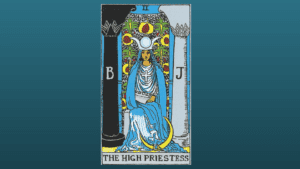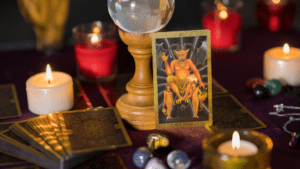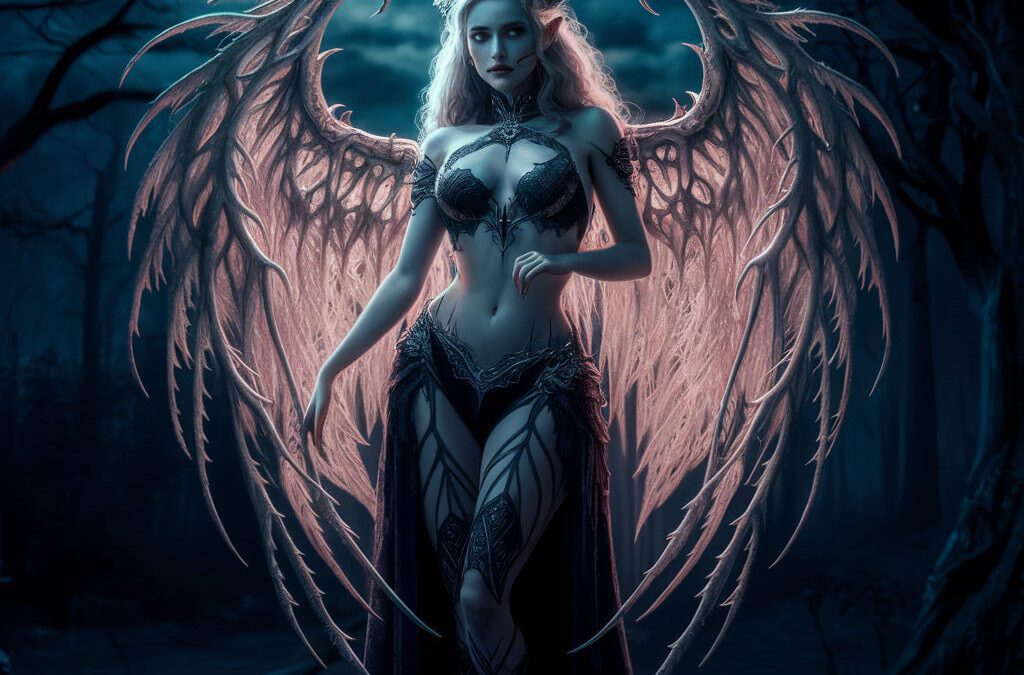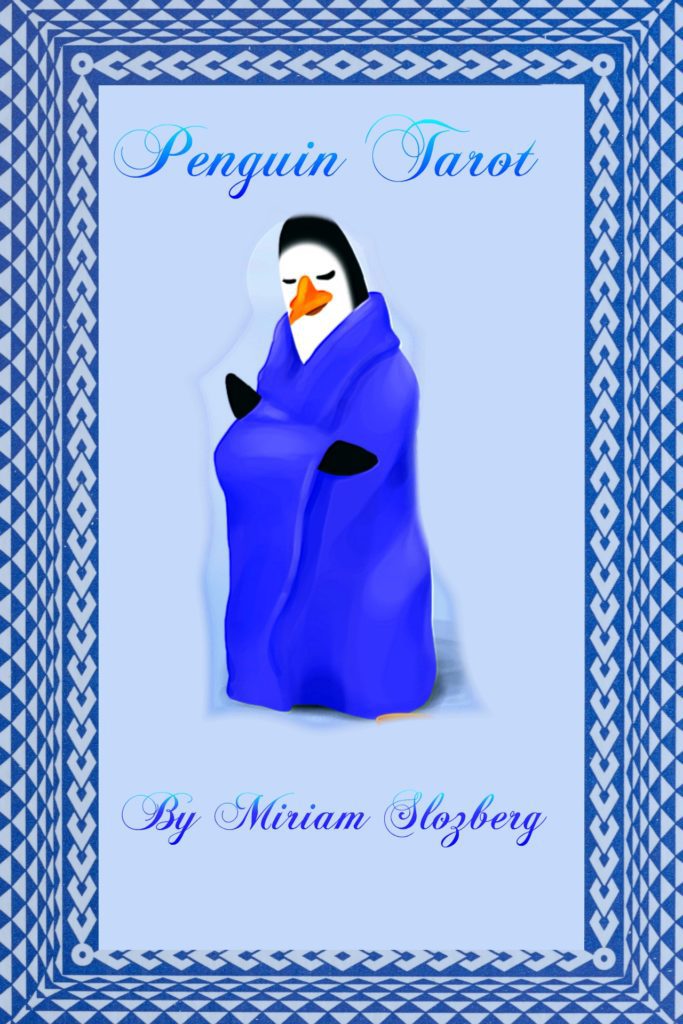Tarot cards have been used for self-reflection, insight, and divination for a long time. They contain rich symbolism with various archetypal figures, each representing multiple aspects of the human experience.
Although there isn’t a specific tarot card dedicated to Lilith, the mythological figure known for her rebellious and independent nature, some readers associate her with certain cards based on her archetype and attributes.
The two tarot cards that best match Lilith are the High Priestess and the Devil. Let’s delve into the High Priestess first.
Quick Navigate This Post
The High Priestess Tarot Card

The high Priestess tarot card was designed in Canva Pro.
The High Priestess card often represents feminine power, intuition, and hidden knowledge. It symbolizes the depths of the subconscious mind and the connection to the divine feminine.
Lilith, known for refusing to be subservient to Adam, rejecting societal norms, and associating with independence and strength, resonates with the energy of the High Priestess.
Both Lilith and the High Priestess symbolize a deep alignment with intuition and the embracing of one’s inner wisdom. Lilith is relevant to the High Priestess because she embodies intuition and feminine power.
Embracing Intuition and Feminine Power
In a tarot reading, if the High Priestess card appears in a position related to personal empowerment or intuition, it could symbolize the archetype of Lilith.
This suggests that the individual is being called to embrace their inner power, trust their intuition, and tap into their feminine strength.
Just as Lilith refused to be subservient to Adam, this card encourages people to honor their wisdom and guidance, assert their independence, and embrace their unique feminine power. The High Priestess may also match the Devil tarot card archetype even more.
The Devil Tarot Card

The devil tarot card was designed in Canva Pro.
The Devil card is often depicted as a symbol of bondage and temptation. It can be associated with Lilith regarding liberation and breaking free from societal constraints.
In her mythological story, Lilith left the Garden of Eden rather than submitting to Adam, which is seen as an act of rebellion and a refusal to conform.
This rebellious and non-conformist aspect of Lilith’s archetype can be connected to the energy of the Devil card, representing the freedom to explore one’s true desires and authentic self. In a way, the Devil card is about breaking free from societal norms, which aligns with Lilith’s story.
Breaking Free from Societal Constraints
When the Devil card appears in a reading about liberation or breaking free from societal norms, it may symbolize Lilith’s rebellious nature.
This card can represent an individual’s journey to free themselves from the chains of societal expectations, dogma, or limiting beliefs.
Like Lilith’s refusal to conform and her departure from the Garden of Eden, the Devil card encourages the individual to question authority, challenge societal conventions, and embrace their authentic self.
It is interesting since the thought of being pressured to conform to society makes me feel resentful, yet at the same time, if I feel like I’m falling behind in some way, it can be painful. It’s contradictory, and my 3rd house, Pisces Lilith, definitely reflects that.
The 3rd house relates to communication, mental processes, and the immediate environment. When Lilith is placed in this house, it can indicate a strong tendency to question and challenge societal conventions related to communication and perception of the world. In Pisces, this rebellious energy is infused with a dreamy and intuitive quality.
Furthermore, Lilith forms a trine with my weakened Cancer Saturn in the 7th house. A trine indicates a harmonious aspect, implying that these energies can collaborate productively. Saturn in the 7th house often signifies a feeling of duty and dedication in relationships, which contributes to my reluctance to intervene in my roommate’s marriage.
Having Saturn in the 7th house might suggest a more conventional view of relationships. However, the trine to Lilith likely explains why I integrate my desire for independence and breaking free from societal constraints within my partnership.
Even though I’m married, I live as if I’m single. I’m not seeing anyone else because I’m only dating myself after sacrificing myself due to extreme people-pleasing for decades.
With the sextile to my Taurus Mars, also debilitated in the 5th house, my desire for freedom and breaking societal constraints can be channeled into creative self-expression and finding innovative ways to assert myself. That makes sense based on my writing ruffling some feathers.
However, Lilith also squares my retrograde Neptune in the 12th house. This aspect may create internal conflicts between my desire for independence and societal expectations, leading to feelings of uncertainty or a struggle to find clarity in breaking free from societal constraints.
I am currently estranged from my brother. I don’t know my current neighbors and prefer keeping it that way. I didn’t get along with the neighbors from my old neighborhood either.
In addition to myself, the Devil matches Lilith’s archetype due to the connection between wanting to embrace the shadow aspects and exploring desires.
Exploring Desires and Embracing Shadow Aspects
If the Devil card appears in a reading related to exploring desires or shadow aspects of the self, it can be connected to Lilith’s energy. This scenario suggests that the individual is being called to acknowledge and embrace their darker or more taboo desires without judgment.
Like Lilith, who embodies primal desires and rejects societal norms’ limitations, the Devil card invites individuals to explore their authentic desires, acknowledge their shadow aspects, and integrate them into their identity.
There isn’t a specific tarot card that directly represents Lilith, but some of her characteristics and archetypes can be associated with certain tarot cards.
The High Priestess reflects her intuitive and independent nature, while the Devil symbolizes her rebellion and refusal to conform. These associations show the diverse symbolism within tarot and highlight the potential for personal interpretations based on mythological figures and archetypes.
Remember that tarot is a deeply personal and intuitive practice, and individual interpretations may vary. Exploring the connections between mythological figures, such as Lilith, and tarot cards can provide insightful perspectives and deepen our understanding of the human experience.
If you want to dive deeper into the world of tarot, raw spirituality, and mental health, subscribe to my Substack and be part of a great community! Also, don’t forget to listen to The Tarot Table Podcast, which has new episodes each Friday.

